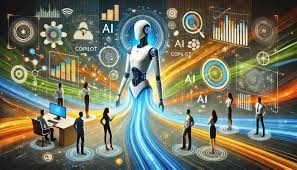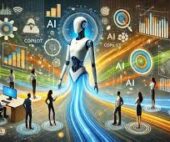The Rise of Agentic AI: Transforming Industries and Redefining Workflows
Artificial Intelligence (AI) is evolving faster than we anticipated. No longer limited to predicting outcomes or generating content, AI systems are now capable of handling complex tasks and making autonomous decisions. This new era—driven by Agentic AI—is set to redefine the workplace and transform industries.
From Prediction to Autonomy: The Three Waves of AI
To understand where we’re headed, it’s important to see how far AI has come.
- Predictive AI: The first wave focused on forecasting trends, helping businesses optimize decision-making, anticipate customer demand, and enhance operations.
- Generative AI: The next evolution brought content creation and conversational AI, enabling new ways to engage with users.
- Agentic AI: Now taking center stage, Agentic AI prioritizes operational decision-making over content creation. Recognized by Forrester as a leading technology of 2025, it moves beyond insights to reasoning and autonomous action.
Arun Parameswaran, SVP & MD of Salesforce India, describes it as a fundamental shift:
“What has changed with agents is their ability to handle complex reasoning… and, most importantly, to take action.”
Unlike previous AI models that recommend or predict, Agentic AI executes tasks, reshaping customer experiences and operational workflows.
Agentic AI in Action: Industry Applications
At a recent Mint x Salesforce India deep-dive event on AI, industry leaders explored how Agentic AI is driving transformation across sectors. The panel featured:
- Nikhil Asopa, SVP – Customer Experience, Tata Digital
- Dr. Satya Ramaswamy, Chief Digital & Technology Officer, Air India Group
- M.A. Kishen Kumar, Group CTO, ASK Asset & Wealth Advisors
Here’s how Agentic AI is already making an impact:
1. Revolutionizing Customer Support
Traditional chatbots have limited capabilities. Agentic AI, however, understands urgency and context.
- Example: A father orders a bike for his son’s birthday but needs expedited delivery. AI detects this and automatically prioritizes shipping.
- “Agentic AI must ensure empathy, creating a more human-like, caring experience,” says Nikhil Asopa of Tata Digital.
2. Accelerating Business Decisions
In finance and supply chain management, AI agents analyze vast amounts of data and execute decisions autonomously.
- AI handles real-time financial analysis, risk assessment, and compliance, reducing errors and streamlining operations.
3. Transforming Travel & Aviation
Airlines are leveraging AI to optimize booking systems, reduce costs, and enhance efficiency.
- “Agentic AI operates on a ‘request-action’ model, stepping in only when human intervention is needed,” explains Dr. Satya Ramaswamy of Air India Group.
4. Automating Wealth Management
AI agents in financial services monitor markets, adjust strategies, and offer personalized investment recommendations in real time.
- “AI ensures businesses stay compliant while optimizing investments,” notes M.A. Kishen Kumar of ASK Asset & Wealth Advisors.
The Risks & Responsibilities of Agentic AI
With great autonomy comes great responsibility. The potential of Agentic AI is vast—but so are the challenges:
- Accountability & Ethical AI:
- If an AI agent executes the wrong plan, the consequences can be severe.
- Arun Parameswaran stresses the need for human-AI collaboration:“Agents alone won’t deliver what customers need. Success comes from AI and humans working together.”
- Reskilling the Workforce:
- OpenAI’s Jobs of Tomorrow report highlights the urgent need for reskilling workers as AI takes on more operational tasks.
- Data Privacy & Security:
- AI thrives on data, but responsible management is crucial. As M.A. Kishen Kumar notes, greater AI autonomy raises security risks, requiring updated laws and governance.
- The EU’s AI Act is already emphasizing transparency in AI decision-making.
The Future of Work: AI as a Partner, Not a Replacement
Despite concerns about job displacement, AI is more likely to reshape rather than replace roles.
- New Careers Are Emerging:
- AI agent trainers, workflow orchestrators, and AI ethicists will be in demand.
- Tech Giants Are Adopting AI Agents:
- Meta CEO Mark Zuckerberg recently announced plans to replace junior programmers with AI.
- Salesforce CEO Marc Benioff revealed that Agentforce, the company’s AI-powered agent suite, is reshaping its workforce strategy.
- AI Enhances Productivity:
- Microsoft, Salesforce, and Google have launched AI agents for sales, marketing, and research—freeing humans to focus on strategic work.
What Are AI Agents?
AI agents go beyond traditional models like ChatGPT or Gemini. They are proactive, self-learning systems that:
- Understand context
- Perform automated actions
- Integrate with organizational workflows
They fall into two categories:
- Personal AI Agents – Assist individuals (e.g., trip planning, scheduling meetings).
- Business AI Agents – Optimize organizational processes (e.g., customer support, HR automation).
“AI agents don’t just wait for commands; they anticipate needs and act,” says Dr. Tomer Simon, Chief Scientist at Microsoft Research Israel.
AI Agents in the Workplace: A Shift in Roles
AI agents streamline processes, but they don’t eliminate the need for human oversight. Salesforce’s Agentforce is a prime example:
- Since implementing it, Salesforce cut customer service inquiries from 10,000 to 5,000 per week.
- Yet, the company hired 2,000 employees to support its AI expansion, proving AI creates new opportunities.
“Companies need to integrate AI, not fear it. Those who fail to adopt AI tools risk drowning in tasks AI can handle,” warns Dr. Omri Allouche, Chief Scientist at Gong.
The Road Ahead: AI-Driven Business Growth
Agentic AI is not about replacing people—it’s about empowering them.
- For Developers: AI handles routine coding tasks, allowing engineers to focus on architecture, security, and innovation.
- For Managers: AI eliminates bureaucratic inefficiencies, enabling leaders to focus on strategy and business growth.
- For Businesses: AI-driven automation improves efficiency, customer experience, and profitability.
As organizations re-evaluate workflows and embrace AI collaboration, the companies that act early will gain a competitive edge in efficiency and innovation.
Final Thought
The AI revolution is here, and Agentic AI is at its forefront. The key question isn’t whether AI will transform industries—it’s how organizations will adapt and thrive in this new era.












